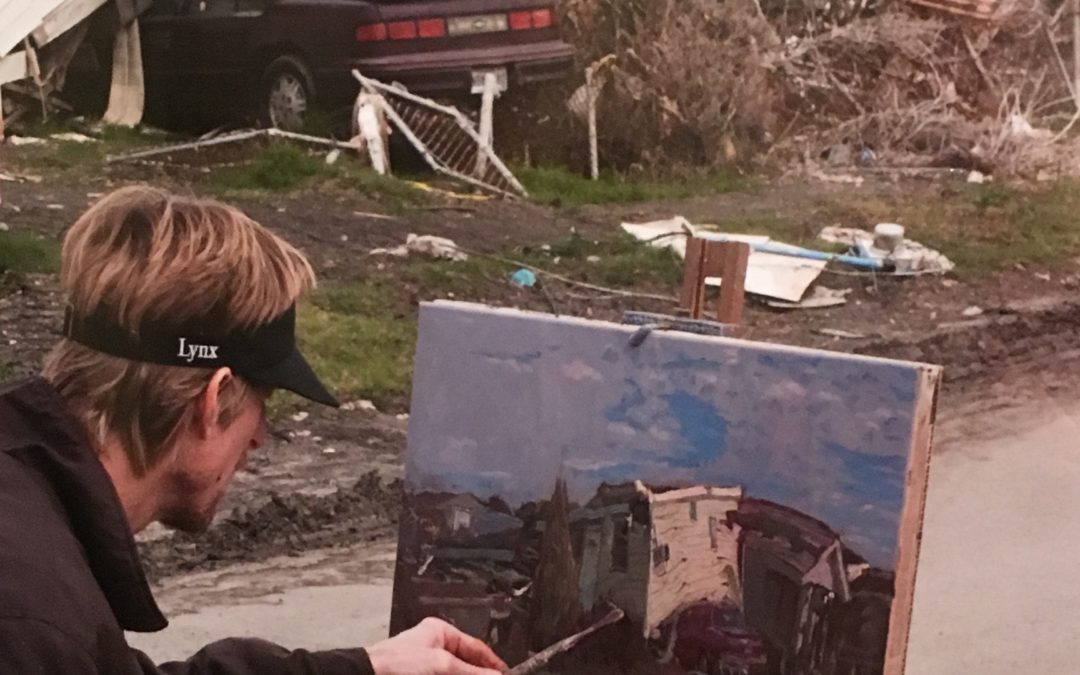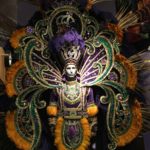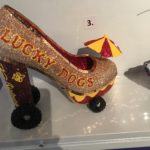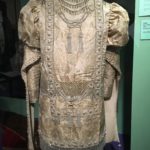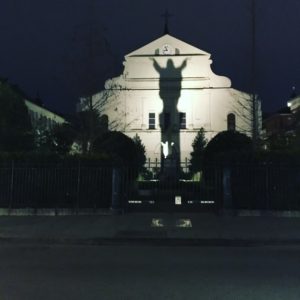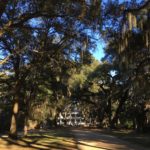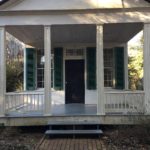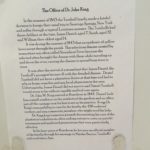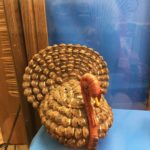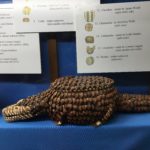Jan. 2-5 New Orleans
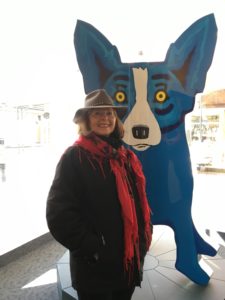
My Cajun version of Charley
To sweeten our long days in the car, we listened to an audiobook of John Steinbeck’s Travels with Charley. Steinbeck found a way, on his 1960 journey across the country, to ask people about what was going on in America. The issues they worried about then seemed easy and old-fashioned, compared to the political Armageddon we are facing 58 years later. Steinbeck’s technique was to invite people into his camper, offering a drink of coffee laced with whiskey. Charley, the poodle, provided a natural entry point for conversation.
But I didn’t have a dog, a camper, or whiskey to offer, and engaging people informally was proving to be more difficult in these hostile times. My profession of journalism, with all of its 2018 offshoots and permutations, has lost its most important function, which is providing the country with a common set of facts. “Where do you get your news?” would have been a good starting point to learn about political views, but it seemed like a hostile question, thanks to President Trump’s attack on the media as “the enemies of the people.”
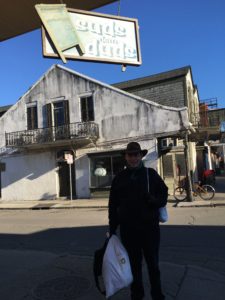
John with our laundry at Suds dem Duds
So I was looking forward, for multiple reasons, to the laundromat in New Orleans. I figured we were all stuck there, and I could start a conversation with my fellow captives. After beignets at Café Du Monde, we found ourselves at the Suds Dem Duds! down the street from our Bourbon Orleans Hotel. Dinah, the proprieter, said she used to sell Volkswagens, and having this laundromat business was a dream come true. I asked her how she felt about 2018, and she was optimistic. Before I could pop my questions about the news and Trump, she turned to help an Australian family, who were emptying their suitcase contents in a jumbo washer. What was it with these Australians? They were everywhere.
From my perch near the door, I snuck glances at a middle-aged nondescript man, a regular named Tom, who was sitting impassively in a folding chair. A quick guess: a veteran with PTSD? Certainly a loner. He never smiled or joined the chitchat of the other customers. Dinah told me, after he left, that he works as a bartender! Maybe he needed some peace and quiet before putting on his smile for work.
I realized I was violating Dinah’s and Tom’s world by lurking around, trying to pry out their political wisdom. The folks I was meeting seemed generally okay, and they deserved to be left in peace to go about their daily business. Nobody wants a Joe Bftsplk https://en.wikipedia.org/wiki/Joe_Btfsplk hanging around, reminding them that their President is a maniac, bringing us to the brink of nuclear war, race war and gender war, as well as the End Times, climate-wise.
So I decided to suspend my search for truth and justice in the random views of Americans. I would just listen
and enjoy the life around me, and New Orleans was the perfect place to start. We visited the Mardi Gras costume exhibit at the Presbytere, and the Battle of New Orleans Civil War display next to the St. Louis Cathedral.
A Katrina photo exhibit offered shocking evidence of both the destruction and heroism of neighbors helping neighbors.
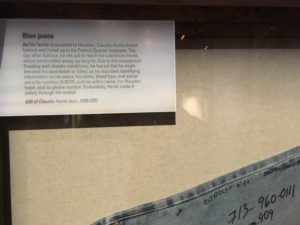
Blue jeans worn by a Katrina survivor, with his Social Security number and other identifying info in case he was found dead
The statue in front of the St. Louis Cathedral, which casts quite a shadow at night, is known locally as “the touchdown Jesus.” Next door, our Hotel Bourbon concierge regaled us with his building’s colorful history: once a convent and then a theater, this was the place where Andrew Jackson declared his run for the presidency. It was also the site of a celebrated Creole duel, leaving bloodstains that are still visible under the carpet on the stairs, according to the concierge, who gives official Haunted Hotels tours. He said that the Charbonnet twins, Stephan and Louis, having had a bit too much to drink, decided to turn to the gentleman’s way of gaining “satisfaction” as they both attempted to court the same beautiful debutante. They engaged in a sword fight, ending up in a tangle as they fell down the stairs, stabbing each other to death. I couldn’t help thinking about their mother, receiving the news.
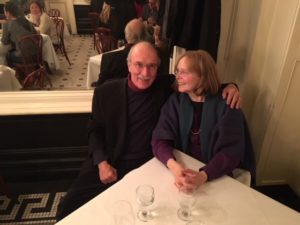
Tennessee Williams’ table at Gallatoire’s
To add to all that drama, we booked Tennessee Williams’ table in the corner at Gallatoire’s. After a festive dinner, with multiple guests celebrating birthdays, we grabbed a taxi out to Mulate’s to hear live Cajun music.
There is a noir underside to the frivolity of The Big Easy. We found the streets a bit sinister and deserted at 9:30 as we left Mulate’s, so we walked very quickly to the nearest lit-up hotel. The concierge told us to wait inside while he called a taxi, confirming that crime is a factor here.
The next day we had breakfast with a friend who works with the families of incarcerated youth. We were inspired again by her work, supporting young people as they leave prison. Some people just try to hold on to what they have. Others, like our friend, go to where the trouble is and try to make things better. How can we do this in a divided world? I was beginning to understand. Start local, with what is in front of you. Find some sort of common ground. Allow people their dignity and a chance to excel.
Driving northwest from cheerful New Orleans, the South was not only frozen, but marked by the legacy of exploitation. On the road to Natchez, MS we stopped by two remarkable places: one was Rosedown, a cotton plantation built in 1835 by the Turnbull family, who had 450 slaves working a total of four estates. The slaves worked 18 hours a day, six days a week. The former Turnbull slaves became sharecroppers for them after the Civil War, and the last descendent of the Turnbull family lived there until 1955. It is a state historic site now, popular with visitors for its gardens in the spring. The whole place, shrouded in Spanish Moss, seemed a little creepy.
- Rosedown
- Rosedown Doctor’s House
- Yellow Fever
No matter where we drove on this journey, there was evidence of Native American life before the Europeans took over. The continent certainly wasn’t “empty” territory waiting to be colonized. In Natchez, the hereditary chief was called the Great Sun, and apparently when he died in 1728 his wives and retainers “were strangled with due ceremony to accompany him into the next life.” His house was burned and the burial mound was raised to a new height, upon which the house of his successor was erected. This was the official description from the Mississippi Department of Archives. Despite this, ethnographer Antoine-Simon Le Page du Pratz, who lived for eight years in France’s Natchez colony with the Indians until relations soured in 1728, found them to be “more civilized, their manner of thinking more just and full of sentiment, their customs more reasonable, and their ceremonies more natural and serious—distinguishing this nation from all others. It was easy to recognize them as more refined and polite.”
- New Indian pine cone baskets displayed at the Natchez Mound Historic site
It was still bitter cold as we drove north. When we were halfway to Natchez, my cell phone rang. It was our B&B hostess calling to tell us her pipes had frozen, there was no water and we couldn’t stay with her. She generously had booked us a room at a more ostentatious antebellum mansion called Dunleith Castle. The estate was built in the late 18th century by a couple whose daughter was widowed at the age of 15. Her second husband lived longer than she did, and rebuilt the house after it was struck by lightning and burned to the ground. This did not seem like a lucky place to spend the night.
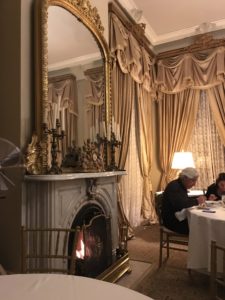
The dining room at Dunleith Castle, Natchez
We were looking for a little warmth and rest, as we retreated to our small room behind the Dunleith kitchen. A big challenge loomed the next day: we needed to drive halfway across Texas, if we were going to meet our friends in Santa Fe by Jan 7. We dreaded this leg of the trip. A fully armed population of Good Old Boys in pickup trucks, speeding around in their Trump Virtual Reality world, did not bode well for a Massachusetts car. I expected trouble, but not in my wildest nightmares, did I anticipate what came next.
NEXT: A CLOSE CALL IN THE BIBLE BELT

